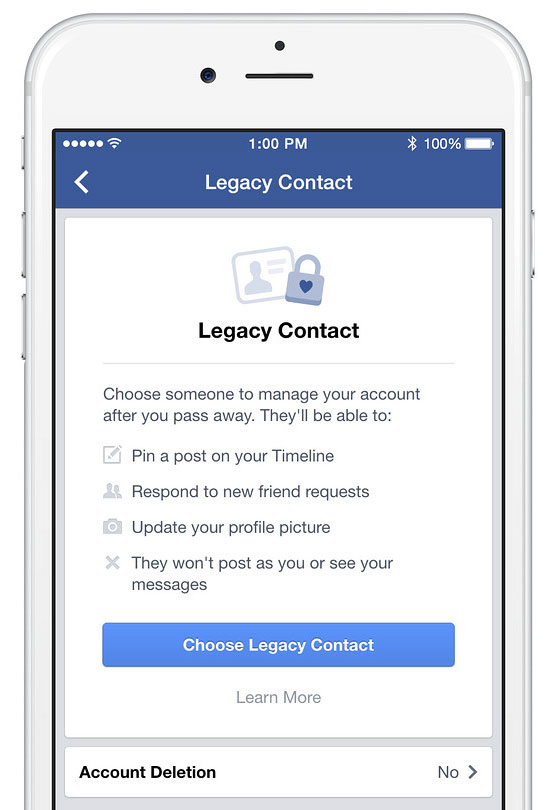شاید نتوانید دوستان فیس بوکی خود را پس از مرگ همراه خود داشته باشید، اما همچنان قادر خواهید بود که از کامنت های توهین آمیز آنها و دیگر افراد در صفحهتان جلوگیری کنید و در عین حال یاد خود را نیز زنده نگه دارید.
فیس بوک اعلام کرد که کاربران این شبکه اجتماعی میتوانند برای ادامه فعالیت صفحه خود پس از مرگ، یک فرد جایگزین معرفی کنند. به گفته وال استریت ژورنال، تعدادی گزینه به منظور انتخاب یک قیم دیجیتالی برای کاربران و به عنوان زندهنگهداشتن صفحه و یا اعلام حذف صفحه پس از مرگ آنها برای کاربران فیس بوک فعال خواهد شد.

در حال حاضر اگر فیس بوک متوجه مرگ کاربران خود شود، اجازه درج هیچگونه مطلب دیگری را در صفحه آنها نمیدهد.
بر اساس این گزارش، این گزینهها از امروز برای کاربران آمریکایی فعال میشود و کاربران دیگر نقاط دنیا نیز به مرور به آن دسترسی پیدا خواهند کرد.
اما هدف از ایجاد یک قیم دیجیتالی چیست؟ این فرد قادر خواهد بود صفحه شما را به عنوان زندهنگهداشتن یاد شما و یا در حالتی واقعیتر، در قالب “یک مقبره دیجیتالی” مدیریت کند. این کاربر میتواند پستهایی در بالای صفحه فرد درگذشته بنویسد، تصویر پروفایل وی را تغییر دهد و یا حتی از طرف فرد مرحوم درخواستهای دوستی را جواب دهد.
این گزینهها اختیاری و قابل تنظیم است. اگر شما هیچ کاری نیز انجام ندهید، فیس بوک طبق رسم گذشته خود صفحه شما را پس از مرگز فریز میکند.
قیم و نماینده یک فرد بودن، به معنای ورود (Login) به حساب متوفی نیست. کارهایی هستند که قیم نمیتواند انجام دهد. کارهایی چون ویرایش مطالب گذشته فرد درگذشته و ویرایش اطلاعاتی که دوستان وی در صفحه نوشتهاند، برای فرد وصی ممکن نیست. این کاربر همچنین نمیتواند تصمیم به حذف اکانت کاربر مرحوم بگیرد. (مگر اینکه فرد درگذشته این اجازه را قبل از مرگ صادر کرده باشد.)
چنین سختگیریهایی ممکن است باعث ناراحتی کاربر وصی شود، اما یکی از سخنگویان فیس بوک میگوید ما در مورد این گزینهها بسیار فکر کردهایم و در نهایت برای مرحله ابتدایی این محدودیتها را اعمال خواهیم کرد.
برای انتخاب قیم دیجیتالی خود میتوانید به بخش Setting و سپس Security و در نهایت بخش Legacy Contact در انتهای صفحه بروید. در اپلیکیشن و نسخه وب این مسیر مشابه خواهد بود. در این بخش میتوانید یکی از دوستان خود را به عنوان Legacy Contact خود برگزینید. باید توجه داشت که این فرد باید در شبکه اجتماعی شما باشد. در آنجا نیز امکانات مختلفی برای دسترسیهای فرد قیم قرار داده شده است.
منبع : WSJ
Facebook Heir? Time to Choose Who Manages Your Account When You Die
Facebook Heir? Time to Choose Who Manages Your Account When You Die
You can finally decide what happens to your Facebook account when you die.
In a change of heart, the world’s most popular social network will begin allowing its members to designate someone—what they call a “legacy contact”—to manage parts of their accounts posthumously. Members can also choose to have their presence deleted entirely.
Facebook and other Internet services walk a difficult tightrope between respecting the privacy of the deceased and the demands of grieving friends and family. Previously, Facebook automatically froze the accounts of members it learned had died, angering some heirs who wanted to edit the deceased’s online presence. It will roll out the new options to members in the U.S. on Thursday, with others to follow later.
Asking us to make plans for a digital afterlife may sound morbid, but it can bring clarity to an issue that’s both legally and emotionally challenging. In 2013, Google became the first major Internet company to allow users to select digital heirs for its Gmail, cloud storage and other services, dubbed “inactive account managers.”
What’s the point of maintaining a social network after death? Facebook legacy contacts will be able to manage accounts in a way that can turn the deceased person’s Facebook page into a kind of digital gravestone. Legacy contacts can write a post to display at the top of their friend’s memorialized profile page, change the friend’s profile picture, and even respond to new friend requests on behalf of the deceased.
If they’re granted prior permission, legacy contacts can also download an archive of posts and photos from the deceased, but not the contents of his or her private messages.
All of this is optional. If you do nothing, when Facebook finds out you’ve passed, it will simply freeze your account and leave posts and pictures at the privacy settings you determined, a process it calls memorialization. Facebook says it has done this to hundreds of thousands of accounts to date. (As before, Facebook won’t show advertisements on memorialized accounts.)
Being a legacy contact is different from simply logging into the account of the deceased, and there are important things legacy contacts can’t alter. They can’t edit what the deceased has already posted, or what his or her friends post on the page. If you chose to post a photo while you are living that looks embarrassing when you are gone, your legacy contact can’t do anything about it. A legacy contact also can’t decide to delete a whole account.
These restrictions might upset some people who think their job as a caretaker is to maintain a Facebook page as the nicest possible memorial. “We gave this a lot of thought, and ultimately decided against it for this first version,” said spokeswoman Jodi Seth. Facebook feared that curation responsibilities might add an extra emotional load to grieving, among other concerns.
To select your legacy contact, go to Settings and choose Security and then Legacy Contact at the bottom of the page—it is the same for the Facebook website or mobile app. There you can designate an existing Facebook friend (in other words, only someone who’s already part of the social network), grant that person permission to download an archive of your data, or choose to have your account deleted after death.
There’s more fine print worth paying attention to: You can select only one person—and no backup—so spouses and partners who often travel together may face a difficult choice about whether to designate each other. Ms. Seth says Facebook is continuing to think about how it might allow for contingent legacy contacts.
Facebook members can change their legacy contact selection at any time, but once they have died, a legacy contact can’t pass along the responsibility to someone else.
If you don’t choose a legacy contact on Facebook but name a digital heir in a legal will, Facebook will designate that person.
It’s exhausting to think that Facebook has become so interwoven into our lives that we not only have to think about setting our birthdays, relationships and jobs in stone there, but now also our deaths. Still, Facebook’s new service empowers people to make choices about their data while they are living, and for many, that’s a relief.
 گجت نیوز آخرین اخبار تکنولوژی، علم و خودرو
گجت نیوز آخرین اخبار تکنولوژی، علم و خودرو 






